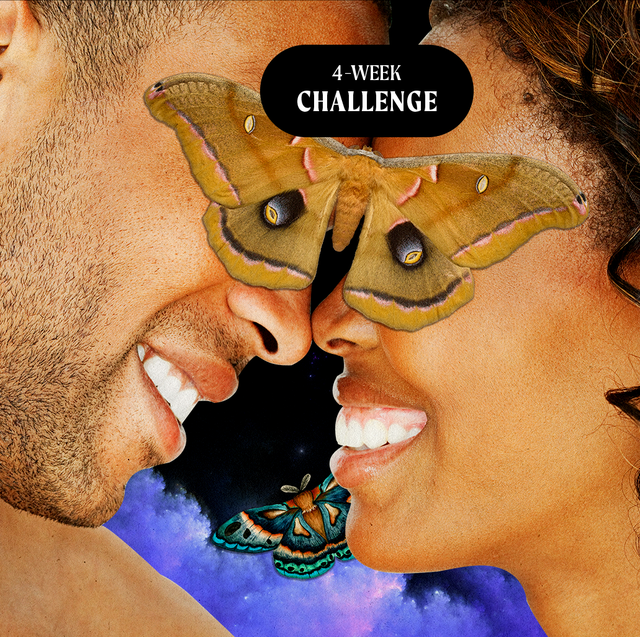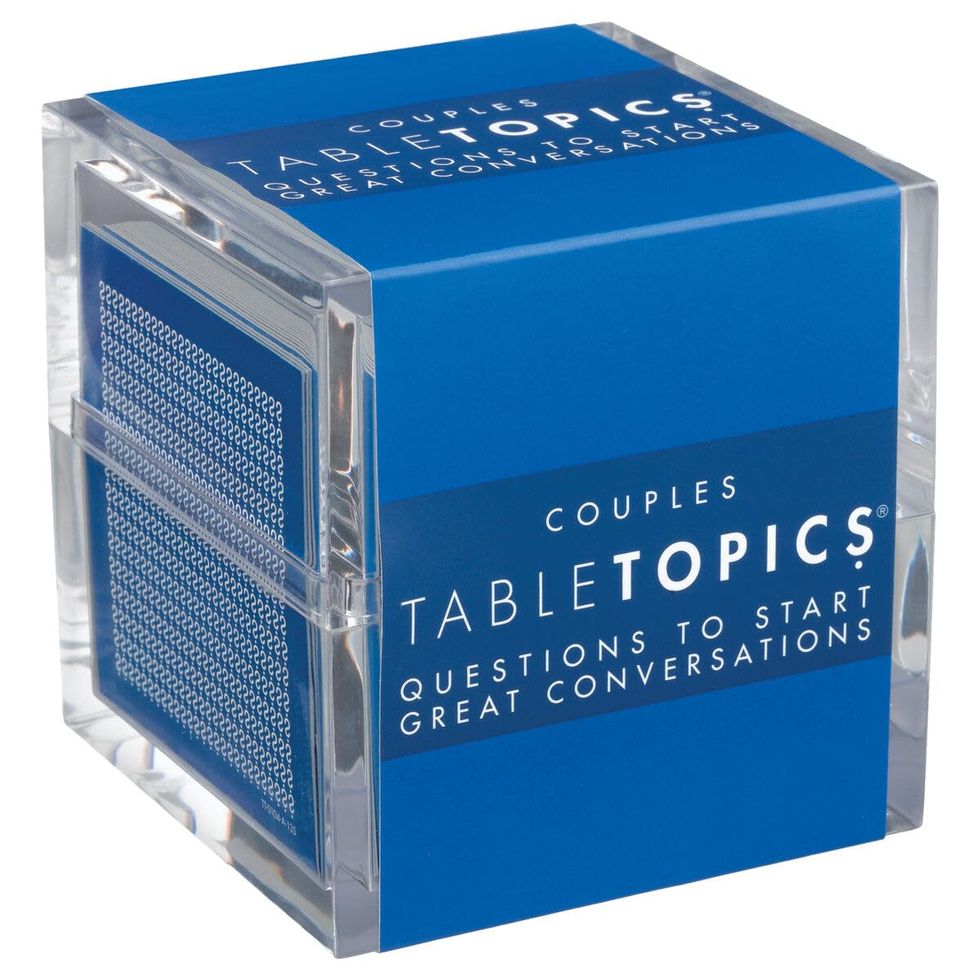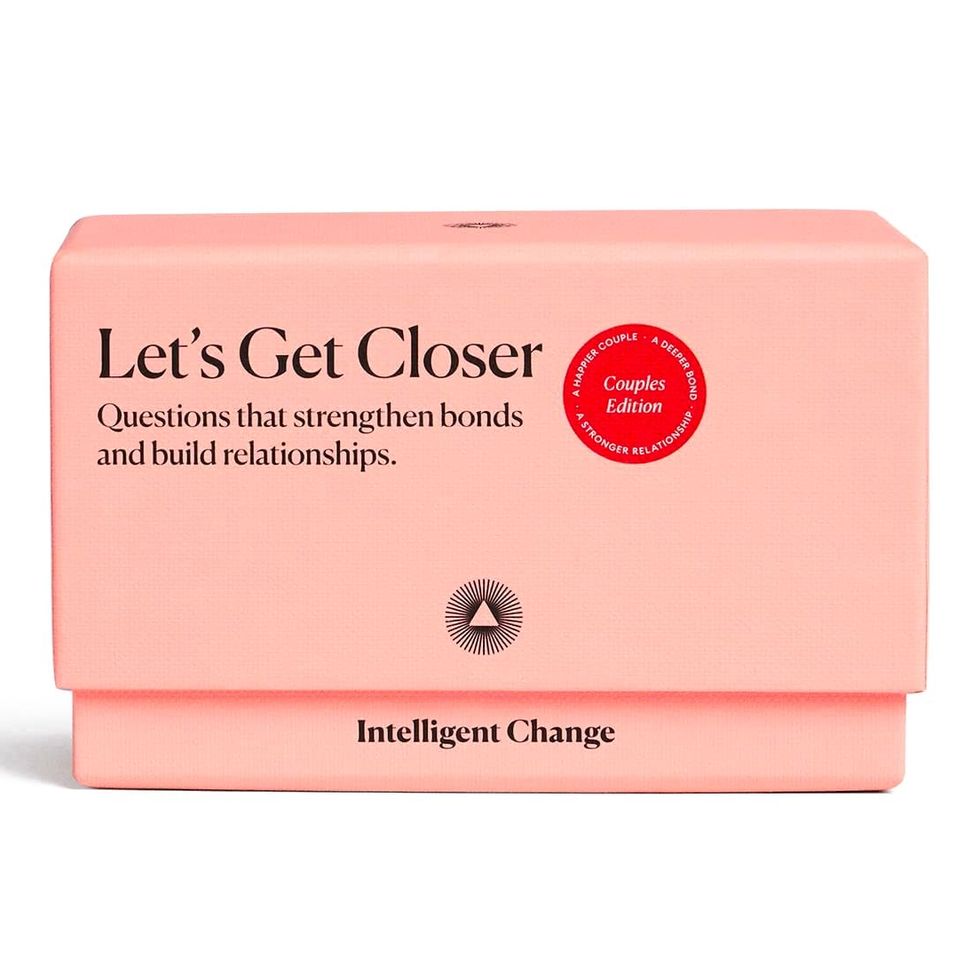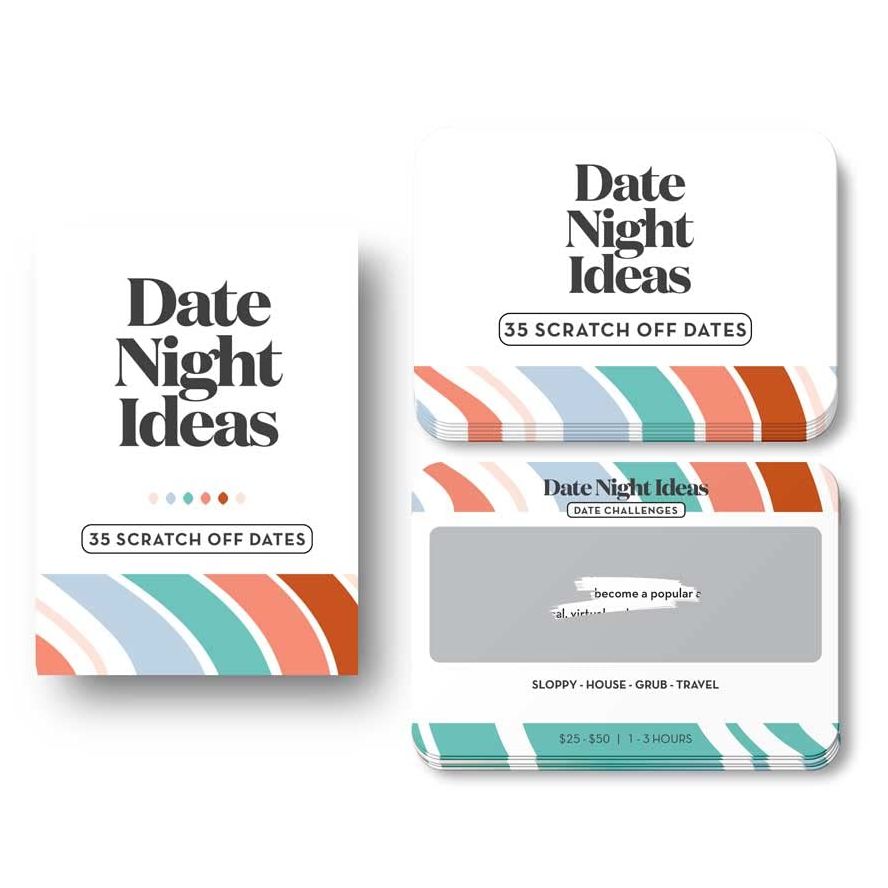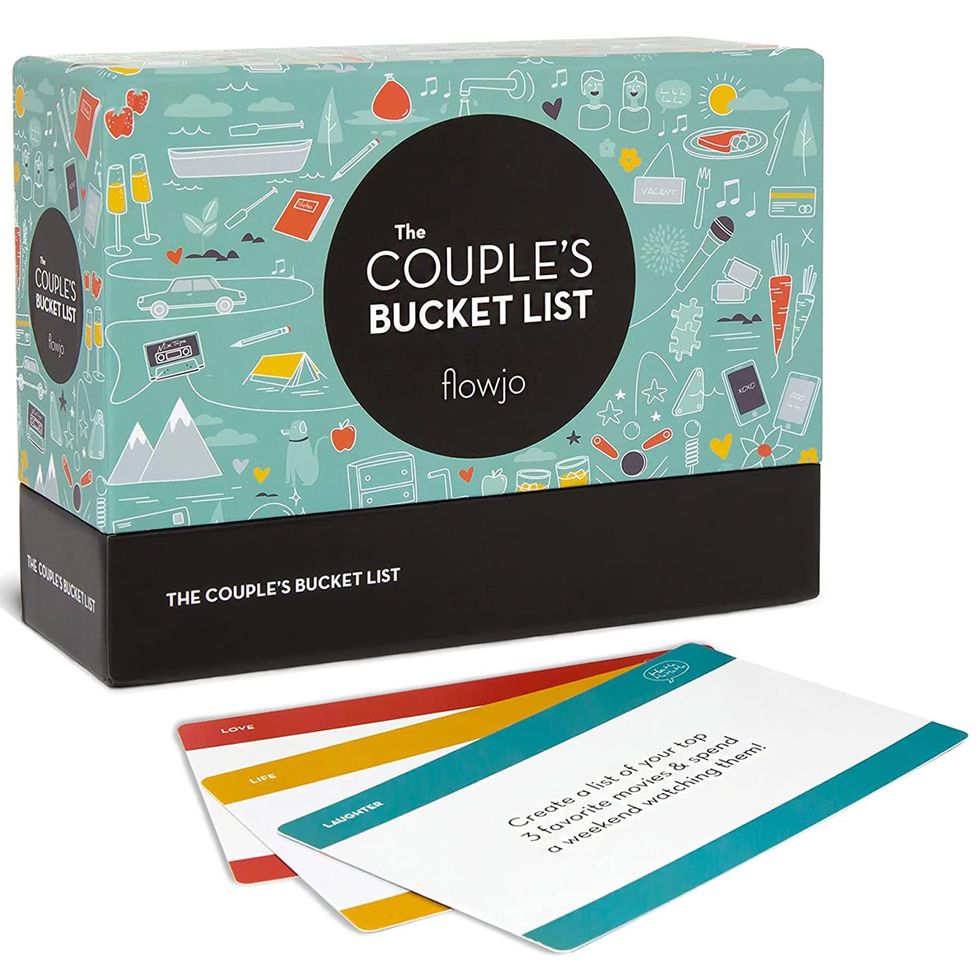When you hear the word "intimacy," you probably start conjuring some, you know, ~sexy~ images (and I don't blame ya!!). Intimacy is key in a healthy, successful relationship, but sexual intimacy is not the only kind of intimacy that matters. That's right, friends—I'm talking about emotional intimacy, which is all about feeling seen, heard, and understood by your partner (and vice versa, 'cause a relationship is a two-way street!). Even if you feel like your relationship is pretty rock-solid, there's always space for deepening your bond, and we're here to show you exactly how to do so.
Here's the thing about intimate relationships: They're like plants. They need consistent care and attention in order to thrive (yep, even those self-sufficient lil succulents!), and if you don't tend to them, they just shrivel up and look really sad on your windowsill. Forging a meaningful bond with your partner isn't a one-and-done situation, and if you start to neglect your relationship, that bond will need some extra TLC to get rebuilt. Luckily, it may be easier than you think to develop and deepen emotional intimacy in your partnership—as long as you're both willing to put in the work.
Whether you're looking to get your relationship back on track or make it stronger than ever, this four-week challenge is for you. And we won't just throw a bunch of tips at you (although there will be concrete advice, of course)—this "challenge" is also about getting the tools you need to become more comfortable with emotional intimacy.
Over the course of this four-week challenge, you'll learn:
- How to build emotional intimacy in your relationship.
- Specific tips and tricks for deepening the emotional connection between you and your partner.
- How to identify characteristics and signs of emotional intimacy (as well as a lack of emotional intimacy).
- Which games and activities you can use to strengthen the bond with your partner.
This monthlong bootcamp is designed to help you ask the right questions and develop the right habits so you can know your partner on a deeper level—and so they, in turn, may understand you better, too! But first things first: Why is emotional intimacy so important to have in a relationship? As psychologist, relationship expert, and author Dr. Tracy Dalgleish tells Cosmo, "Emotional intimacy is what helps to build security between two people. That security is about trust, vulnerability, and safety. When we feel securely connected with others, we feel safe and seen." Basically, it's the glue that keeps you and your other half together through good times and bad.
With each weekly task, the hope is that you feel a *bit* closer to your boo than you did before—and you feel more seen, heard, and understood by your partner in return. Oh, and btw: When you allow yourself to be emotionally intimate with a partner, it's often easier to be sexually intimate. It's a bit of a "chicken or egg" paradox (which comes first—emotional or physical intimacy?), but as Dr. Dalgleish points out, desire and arousal are often heightened by emotional connectedness. (Have you ever seen Dr. Rosemary Basson's model of the sexual response cycle? Responsive sexual desire is v much a thing!) Having better sex isn't the main objective of this challenge, but it could be an added bonus if you and your partner achieve deeper emotional intimacy. Just saying.
And FYI, you don't necessarily have to get your partner ~on board~ for this challenge. The hope is that when you exercise empathy and understanding, your S.O. will instinctively feel more willing to be genuine with you. "We are wired for connection, so feeling emotionally close is soothing and healing to us, at a conscious and nervous system level," explains licensed marriage and family therapist Shadeen Francis. "Research shows that emotional closeness is important in a relationship because it helps build trust, lower stress, and increase relationship satisfaction." It's science, ppl!!
Ready to get those feel-good vibes flowing between you and your S.O.? Right this way, pls.
Week 1: Provide daily affirmations.
Listen, who doesn't like to be told they're doing a good job? It's a fact of life that being told you're doing well feels...well, good, so ofc your partner would like to receive positive feedback from their fave person (aka you!!). Even if words of affirmation isn't your partner's love language, it's essential to acknowledge their contributions (and not just by thanking them for unloading the dishwasher, though that's important, too!). Recognizing your S.O.'s actions and attributes helps them to feel more appreciated because nobody wants to be taken for granted, agreed?
"In relationships, we often get caught in the notion that we need to do things for our partner (e.g., household tasks) or plan big activities (e.g., the date night out)," Dr. Dalgleish says. "For some people, they need recognition and appreciation. Expressing this is a form of emotional intimacy." Sure, Big Romantic Gestures are nice, but sometimes, saying something as simple as, "I'm thankful for you and everything that you do" is just as meaningful—if not more so. When you make a habit of giving positive feedback to your partner, they'll know you value them and what they contribute to your relationship...which will then reinforce considerate behavior. It's a win-win!
In addition to providing reassurance to your partner, daily affirmations are great for expressing gratitude. "Gratitude is always a wonderful thing for both partners to give and receive," notes sex and relationship therapist Dr. Debra Laino. "'I am so grateful I have you,' 'I am so grateful we get to spend so much time together,' and 'I am so grateful I get to share my life with you' are all important to say often." Just make sure these words are coming from a genuine place—an empty expression of gratitude won't have as much of an impact as one you actually mean.
How to do it: Small gestures go a long way, and daily affirmations (whether written or verbal) are key practices. But...what exactly should you say? As Francis suggests, "The best affirmations are honest expressions that reassure you that you are loved and that you matter. As you get to know your partner, notice the places where they have expressed shame, fear, or self-doubt. How can you be reassuring in your words or in your actions?" Think about the attributes in your partner that you're most grateful for or the qualities they have that inspire you—then let 'em know just how much those qualities matter to you!
When in doubt, go ahead and ask your S.O. exactly what they'd like to hear from you. "It’s important to know what feels good to your partner, because we often project what we would want to our partner, and sometimes it is different," Dr. Laino says. In fact, it can be a demonstration of intimacy to ask your partner what would feel good for them to hear or receive from you. If you're still at a loss, eharmony relationship expert Minaa B. has some suggestions:
Try saying or texting some words of affirmation to your partner once daily and see how they respond. Chances are, they'll be feeling more grateful and appreciative of you in return!
Week 2: Get vulnerable.
I understand the temptation to keep things easy-breezy...but if there's anyone you should be able to ~get real~ with, it's your partner. Allowing yourself to get vulnerable with an S.O. helps you to avoid a surface-level relationship, where things are fine 'n' dandy all the time (even when they're not). "Understand that vulnerability comes from opening up, and communicating is important," Dr. Laino tells us. And while vulnerability may seem scary, it's an essential way to build intimate, trusting bonds.
For instance, instead of simply saying "good" or "fine" when your partner asks about your day, you can try to get into the habit of *actually* sharing how your day went. "After a difficult day, instead of pushing it away or minimizing it, share your internal thoughts and feelings of the event," Dr. Dalgleish suggests. According to her, you can encourage the same habit in your partner by "asking questions that involve giving details instead of a yes/no question," such as, "Tell me about a time when you felt anxious today" instead of "Did you have a good day?"
You don't have to stick with the present moment, either. Another way you can demonstrate vulnerability is through asking each other deep questions about previous events or future desires, which "requires your partner to go internally and share their more private thoughts with you," according to Dr. Dalgleish. And naturally, this openness and honesty can't just go one way—if you want your partner to let down their walls, you should be willing to let yours down as well.
How to do it: Before you start sharing, try to eliminate distractions. Dr. Dalgleish suggests taking ten minutes at the end of each day to put your phones away and really talk. "Curiosity and true listening are key skills to practice when sharing," she says. She also suggests probing a tad deeper when your partner shares something with you rather than taking their answers at face value. "Questions that start with who, what, where, when, and how are great questions," she adds.
What exactly should you discuss and share during these vulnerable conversations? Start by talking about your respective days, and see if those convos branch into larger discussions of your fears, insecurities, hopes, or dreams. "Share your feelings, even when they're negative or difficult, to incite open conversation," Minaa B. suggests. "And share your goals and dreams, even when they're ambitious or uncertain." During these convos, try to keep an open mind, both to feedback from your partner and any feelings they may share with you.
Oh, and btw: For those who don't know how to get these vulnerable convos started, there are plenty of games and activities that can help!
Week 3: Create new relationship rituals.
Deepening emotional intimacy takes time, but it doesn't necessarily have to be time-consuming. Rituals of connection are intentional times that partners spend together, and even if you don't have time for a weekly date night, these relationship rituals allow you to feel cute lil moments of closeness together throughout the day. "For many, it is as simple as a hug," Francis says. "But this could also be about asking about each other’s feelings, sharing a little uninterrupted time together, or doing a task for each other that feels caring, like making the morning coffee."
Not every relationship will benefit from the same rituals. It all depends on your love languages—i.e., words of affirmation, acts of service, quality time, physical touch, or gifts. As Minaa B. explains, "When it comes to relationship rituals, consider the emotional needs of your partner to ensure you are speaking to them in their love language." Rituals are only as meaningful as their impact, so don’t be afraid to ask each other what small gesture would feel like a demonstration of care.
Think about what would make both you and your S.O. feel good, and then think about how you can turn that into a ritual that you two share. And remember: It's not that serious, bb. "A core need in a relationship is to play and have fun," Dr. Dalgleish shares. "Tapping into our silly sides and integrating this into our day-to-day lives is important." With relationship rituals, the rules are few and the possibilities are endless...so long as you make sure that you and your partner both have the time and energy for the rituals you create.
How to do it: Start small with daily rituals that you can your S.O. can reasonably perform together once a day. Relationship researchers John and Julie Gottman recommend that couples share a six-second kiss or a 20-second hug everyday in order to release oxytocin (aka the "cuddle" hormone), which builds closeness and connection. "Start your day with a deep hug and don’t rush," Dr. Dalgleish suggests. "If you’ve stepped away from your longer kisses, go back to that lingering kiss."
Not into physical touch? Do something small that says "I'm thinking of you" on a daily basis instead, or bond through a daily activity, like listening to music or cooking together. In addition to working daily rituals into your routine, try to brainstorm some weekly, monthly, and annual traditions that the two of you can keep. "I like weekly meetings to talk about goals and events of the week," says Dr. Laino. "Relationship celebrations are good every quarter to celebrate the growth of the relationship, as is learning a new skill together (such as dance, cooking, or pottery) once a year."
Here are some suggestions from Minaa B. for relationship rituals you can incorporate into your routine:
- Regularly expressing gratitude or appreciation to each other throughout the day.
- Bringing flowers or a small gift home from work that says “just thinking of you.”
- Setting aside a specific time each day for uninterrupted conversation: no phones, TV, distractions, etc.
- Establishing a weekly date night to spend quality time together.
- Starting or ending the day with a hug or kiss.
- Sharing a meal together without any distractions and even cooking the meal together as a form of partnership.
- Regularly writing loving and affectionate text messages to each other.
- Celebrating each other's achievements, no matter how small.
Start with one new daily, weekly, and monthly relationship ritual, and—if those rituals are manageable—add more rituals into your routine from there.
Week 4: Make room for spontaneity.
This shouldn't be a surprise to you, but surprises are a great way to get yourself out of a rut (who knew??). Even a relationship that feels fresh and exciting can benefit from a surprise date night or gift here and there, if only because those surprises generate joy. As Dr. Dalgleish explains, "Our minds are really good at finding routine and choosing options that are familiar and comfortable. Spontaneity is all about getting uncomfortable, which is a great ingredient for building intimacy and closeness."
Your whole relationship can't be about the highs and butterflies, of course. But a relationship that lacks any element of surprise tends to be pretty *yawn.* "I never like to use the word spontaneity, as it evokes too much pressure from the honeymoon phase of a relationship," Dr. Laino tells us. "Instead, I ask how couples can add in novelty to their relationship." This can mean planning surprise dates or trips, trying out new hobbies or activities together, surprising your partner with small gifts or acts of kindness, or simply changing up your daily routine by doing something out of the ordinary.
And while "spontaneity" is often linked with "impulsivity," a good surprise usually involves some level of preparation. "Realistically, many people lead busy lives, so it can be hard to coordinate things without a little planning," notes Francis. "Encourage your partner to protect a window of time for connection and allow that to be an example of spontaneity." Spontaneity is all about asking one partner to take the reins while the other relinquishes control, which can be a little unnerving—but it can also have a major payoff.
How to do it: If you're not looking to totally catch your partner off guard, start off with small, unexpected gestures, like a random text message showing your appreciation...or a sexier side of yourself, if that's what you're into. "Spice it up," Dr. Dalgleish suggests. "If you had a memory of your partner from a time when you had sex or were intimate together, share it with them." Speaking of which: If you're looking to get ~spontaneous~ in the boudoir, you can surprise your S.O. with an open conversation about your sexual fantasies (which also involves some vulnerability, ftr!).
And if you're looking to plan a larger scale surprise, look for experiences that you can enjoy together, such as learning a new game, trying a new food, or exploring a new hike. Date nights are not just about restaurants or movies, after all! Just make sure that any experience you plan will 1) work with your partner's schedule and 2) involve something your S.O. actually enjoys—or is at least open to enjoying. As Minaa B. points out, "Learning more about the things your partner likes will help with getting creative to spark things up in your love life!"
Here at Cosmo, we've got T-O-N-S of fun date ideas for you to peruse, but if you need even more inspo, these date night challenge activities should help.
Way to go! You're officially an emotional intimacy pro.
We're so proud of you. 🥲
Meet the experts
- Dr. Tracy Dalgleish is a clinic psychologist, relationship expert, founder of Be Connected, and podcast host for I'm Not Your Shrink. She's also the author of I Didn’t Sign Up for This.
- Shadeen Francis, LMFT, CST, is a licensed marriage and family therapist who specializes in sex therapy, emotional intelligence, and social justice.
- Minaa B., LMSW, is a social worker, mental health educator, eharmony relationship expert, and podcast host for Mindful With Minaa. She's also the author of Owning Our Struggles.
- Dr. Debra Laino is a clinic sexologist, relationship therapist, and international speaker. She's also the author of The Missing Link.
Corinne Sullivan is an Editor at Cosmopolitan, where she covers a variety of beats, including lifestyle, entertainment, relationships, shopping, and more. She can tell you everything you need to know about the love lives of A-listers, the coziest bedsheets, and the sex toys actually worth your $$$. She is also the author of the 2018 novel Indecent. Follow her on Instagram for cute pics of her pup and bébé.
